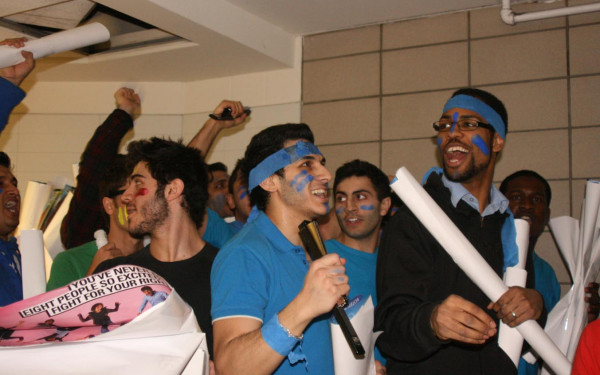Candidate Quibble
Question Period Yields Excitement at CSU Presidential Debates
An already contentious election had the tension cranked up another notch with two presidential debates last week.
While both debates were mostly civil and both sides mostly agreed on the major issues, there were a number of heated moments during the closing question period.
The controversy began after the formal debate had ended at the first event, which was held last Wednesday.
Before a question from current Concordia Student Union VP External & Projects Adrien Severyns, moderator and news editor of The Link Christopher Curtis explained to the crowd that Severyns has ties to the Action slate, as his fellow executives Ramy Khoriarty and Hassan Abdullahi are both running on Action.
The clarification prompted a series of outbursts in the crowd, including cries of “That’s biased” from CSU councilor Stephen Brown, who is running for re-election to council on the Action slate. Before Severyns’ question, Brown and several other Action candidates stacked the line to ask questions to their own candidates and rivals in a public forum.
“I’m just clarifying things; there are allegiances on both sides,” said Curtis to explain the interjection. Severyns and CSU President Heather Lucas have denied political ties to Action. Eleven candidates from Action are members of Lucas’ Fusion slate, while three Fusion members are running with Your Concordia.
Things didn’t calm down following Severyns’ question, asked in French, inquiring as to how candidates planned on working with other schools against tuition hikes, given the need to speak French with the mostly-francophone unions involved.
“I’m not going to embarrass myself in front of all of you with my deplorable French accent,” replied Your Concordia presidential candidate Lex Gill. “I will let you know that I’ve registered for three French classes over the summer and read French fluently,” adding that Your Concordia’s candidate for VP External, Chad Walcott, is fluent in French.
CSU President Lucas, as well as her predecessor Prince Ralph Osei, both don’t speak French.
Other than the skirmish, the debate saw the two sides agreeing more than they differed, declaring that the Canadian Federation of Students, against whom the CSU recently launched a lawsuit, has no place on campus. Both committed to take a tough stance on the Board of Governors and to fight against bottled water on campus.
One area in which they differed was on the subject of student space.
“One thing I want to make clear is that we will not be increasing the fee [levy] next year. […] The second thing is Faubourg is off the map. There is no binding contract right now,” said Action presidential candidate Khalil Haddad.
While there is no contract regarding the Faubourg, there is one that requires the CSU to pursue a student centre, signed by former CSU President Keyana Kashfi in 2009. The contract is a central part of Your Concordia’s student centre stance.
“There is a binding contract with the administration. […] That contract needs to be renegotiated for a number of different reasons. There are a number of misconceptions from the student centre debates in November and March of last year that the student centre would be student owned and managed,” said Gill. “Anyone who sits down and reads that document will realize that it is none of those things.”
The two debates had very different formats following the complications at the first event. While the first featured three candidates on each side—Lex Gill, Chad Walcott and Laura Glover for Your Concordia and Khalil Haddad, Teresa Seminara and Rasim Hafiz for Action—the second debate started as a smaller affair, with only the two presidential candidates flanking Curtis. Candidates, current CSU politicians and journalists were barred from the question period, which was again the period where the most contentious issues came to light. One student pointed out the inaccessibility of Action’s online presence, citing deleted comments on their Facebook page, and questioned the slate’s commitment to transparency.
“There’s always people with political interests that ask questions that aren’t necessarily informative, but just to be able to have a charged question to discredit the other team,” said Haddad. “This is why sometimes we remove unnecessary comments. However, when students rephrase that question in a more respectful manner, that’s when we answer.”
That claim of deleting comments in the name of respectful dialogue was countered by a former student politician. Mike Xenakis, who ran as a presidential candidate on the Community slate last year, claimed that he asked the same question in a progressively more moderate tone three separate times, and was blocked from the group each time.
“Your friend asked the question in a different manner, and we were able to respond within minutes,” countered Haddad. “It’s the way you phrased the question that I didn’t find very constructive.”
The debate did have its lighter moments, as one student asked both slates to fix “the broken/wobbly table in front of the People’s Potato.”
Gill fixed the table with ducktape after the debate.
This article originally appeared in Volume 31, Issue 28, published March 29, 2011.

2__900_600_90.jpg)

